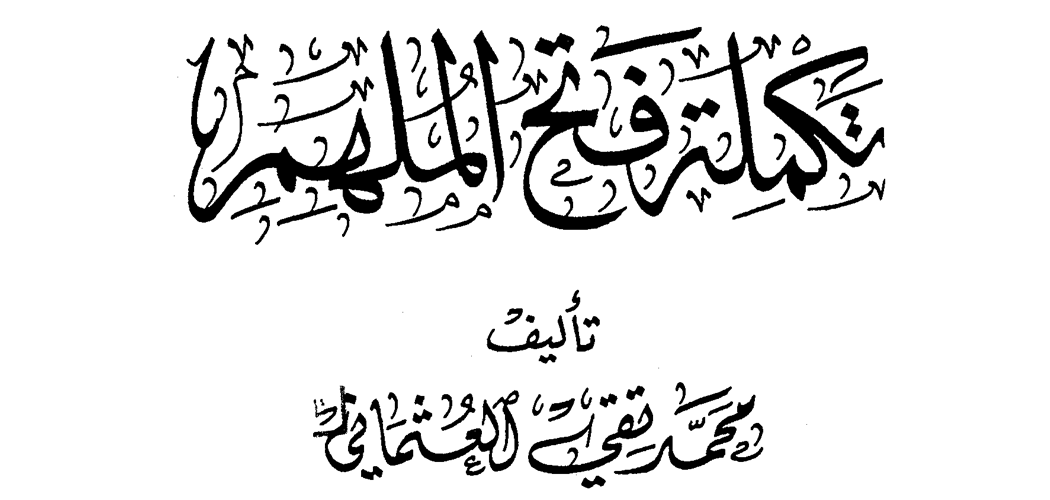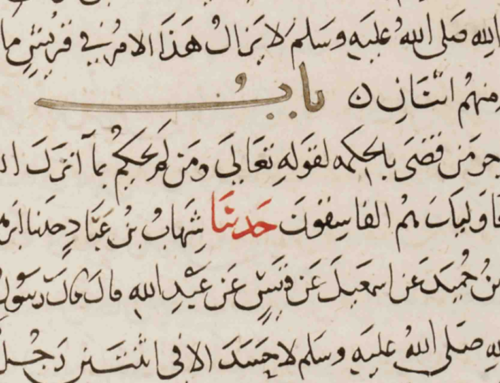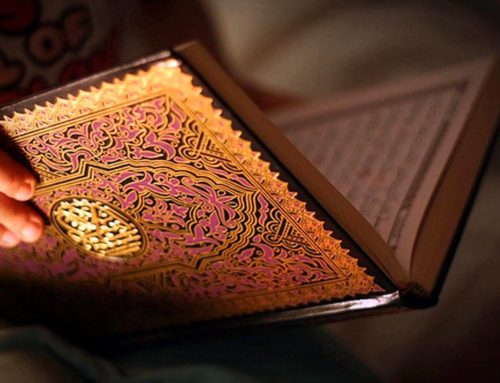Translated by Zameelur Rahman
Ishaq ibn Ibrahim and Muhammad ibn Rafi‘ narrated to us – and the wording is Ibn Rafi‘’s – Ishaq said: ‘Abd al-Razzaq reported to us, and Ibn Rafi‘ said: narrated to us: Ma‘mar reported to us: from Ibn Tawus from his father from Ibn ‘Abbas, he said:
“Divorce, a divorce with three [issuances], in the time of the Messenger of Allah (Allah bless him and grant him peace) and Abu Bakr and two years of the caliphate of ‘Umar was [counted as] one. Then ‘Umar ibn al-Khattab said: ‘Verily, the people have hastened in a matter in which they used to have patience, so if only we were to enforce it on them.’ So he enforced it on them.” (Sahih Muslim)
When a man issues three divorces to his wife in one sitting [1]That is, by saying: “I divorce you, I divorce you, I divorce you.” or with one statement [2]That is, by saying: “I divorce you thrice.”, do they all occur? There are three positions on this question:
First, the position of the four Imams and the vast majority of the scholars from the salaf and the khalaf, and that is that all three occur thereby and the woman becomes mughallazah (permanently irrevocably divorced) [3]There are two types of divorce in the Shari‘ah: a revocable divorce and an irrevocable divorce. The first is the standard form of divorce. In a revocable divorce, the woman remains the man’s wife … Continue reading by means of it, so she is not lawful for her previous husband until she marries [and consummates the marriage with] a husband besides him. This was narrated from Ibn ‘Abbas, Abu Hurayrah, Ibn ‘Umar, ‘Abd Allah ibn ‘Amr, Ibn Mas‘ud and Anas, and it is the opinion of the majority of the people of knowledge from the Tabi‘in and the imams after them, as mentioned in al-Mughni by Ibn Qudamah (7:104). It was also narrated from ‘Umar, ‘Uthman, ‘Ali, al-Hasan ibn ‘Ali and ‘Ubadah ibn al-Samit (Allah be pleased with them) as will come.
Second, that nothing occurs thereby, and this is the position of the Ja‘fari Shi‘ah, as stated by al-Hilli al-Shi‘i in Shara‘i al-Islam (2:57), and al-Nawawi also related it from al-Hajjaj ibn Artah, Ibn Muqatil and Muhammad ibn Ishaq.
Third, the position of some of the literalists and Ibn Taymiyyah and Ibn al-Qayyim (Allah have mercy on them), which is that only one revocable divorce occurs thereby. Ibn Qudamah related it also from ‘Ata’, Tawus, Sa‘id ibn Jubayr, Abu al-Sha‘tha’ and ‘Amr ibn Dinar, but it is not authentic from Tawus and ‘Ata’. As for Tawus, because of what al-Husayn ibn ‘Ali al-Karabisi transmitted in Adab al-Qada’: ‘Ali ibn ‘Abd Allah (Ibn al-Madini) reported to us from ‘Abd al-Razzaq from Ma‘mar from Ibn Tawus that he said about Tawus: “Whoever narrates to you from Tawus that he would narrate three divorces as [being] one, he has lied upon him.” And as for ‘Ata’, because of what Ibn Jurayj narrated, he said: I said to ‘Ata’: “Did you hear Ibn ‘Abbas say: ‘Divorcing a virgin thrice is one [divorce]?’ He said: ‘That did not reach me from him.’” ‘Allamah al-Kawthari (Allah have mercy on him) cited these in his treatise al-Ishfaq ‘ala Ahkam al-Talaq (p. 33, Matba‘ah Majallat al-Islam, Egypt)
The literalists adduce the hadith of the chapter as proof, since Ibn ‘Abbas (Allah be pleased with him) stated explicitly that three divorces used to be counted as one in the time of the Messenger of Allah (Allah bless him and grant him peace); and [they adduce] what Ahmad and others narrated from the story of Rukanah ibn ‘Abd al-‘Aziz ibn ‘Abd Yazid: from ‘Ikrimah, the freed-slave of Ibn ‘Abbas, he said: “Rukanah ibn ‘Abd Yazid, the brother of al-Muttalib, divorced his wife thrice in one sitting, and he became extremely grieved over it.” He said: “The Messenger of Allah (Allah bless him and grant him peace) asked him: ‘How did you divorce her?’ He said: ‘I divorced her thrice.’” He said: “Then, he said: ‘In one sitting?’ He said: ‘Yes.’ He said: ‘Those are [counted as] only one so take her back if you wish.’” He said: “So he took her back.” This is how Ibn Taymiyyah transmitted it in his Fatawa (3:22).
They do not have [any proofs] besides these two hadiths.
The Proofs of the Majority on Three Occurring Together
As for the majority, they have many hadiths that prove the occurrence three divorces, even if a man pronounces them in one sitting, and here are some of them:
- Al-Bukhari transmitted in Bab man Jawwaz al-Talaq al-Thalath from ‘A’ishah that a man divorced his wife thrice, and she remarried and was divorced, so the Prophet (Allah bless hm and grant him peace) was asked: “Is she permissible for the first [husband]?” He said: “No, until he tastes her honey [4]An allusion to sexual intercourse just as the first tasted [it].” Hafiz [Ibn Hajar] in al-Fath (9:321) inclined towards [the view] that this incident is different from the incident of the wife of Rifa‘ah [in which three divorces were issued separately]. Hafiz said: “The proof is in the apparent [meaning] of his statement: ‘he divorced her thrice,’ as it is apparent in them having been issued together.”
- Al-Bukhari also transmitted in that chapter the story of ‘Uwaymir al-‘Ajlani regarding li‘an, where ‘Uwaymir said therein after the mutual imprecation: “I would have lied upon her, O Messenger of Allah, if I keep her,” so he divorced her thrice before the Messenger of Allah (Allah bless him and grant him peace) commanded him. ‘Allamah al-Kawthari said: “And it has not come in a narration from the narrations that he (Allah bless him and grant him peace) condemned him for this, so it proves the occurrence of three together, because the Messenger (Allah bless him and grant him peace) would not have left the people to understand the occurrence of three with one issuance if this understanding was incorrect, and the entire ummah understood that from it, even Ibn Hazm, since he said: ‘He only divorced her when he assumed that she was his wife, and were three not to occur together, he would have condemned him for that.’” End [quote] from al-Ishfaq ‘ala Ahkam al-Talaq.
- Al-Bayhaqi transmitted in his al-Sunan al-Kubra (7:336) from Suwayd ibn Ghafalah, he said: ‘A’ishah al-Khath‘amiyyah was with al-Hasan ibn ‘Ali (Allah be pleased with him) [5]Meaning, she was married to him; when ‘Ali (Allah be pleased with him) was killed, she said: “May you take joy in the caliphate!” He said: “You are expressing glee over the death of ‘Ali?! Go, for you are divorced,” meaning “thrice.” He said: So she covered [herself] with her garment and she sat [in waiting] until her waiting period ended, and then he dispatched to her the leftover which remained of hers from her dowry, and ten thousand [coins] as charity. When the messenger came to her, she said: “A small commodity from a parting lover.” When her statement reached him, he wept, and then he said: “Were it not that I heard my grandfather,” or, “I heard my father that he heard my grandfather say: ‘Whichever man divorced his wife thrice in the periods,’” or “‘thrice’” ambiguously [6]That is, without qualifying it with “in the periods”, “‘she is not permissible for him until she marries a husband besides him,’ I would have taken her back.” Its chain is authentic. Ibn Rajab al-Hanbali al-Hafiz said this after he quoted this hadith in his book Bayan Mushkil al-Ahadith al-Waridah fi anna l-Talaq al-Thalath Wahidah, as found in al-Ishfaq (p. 24), and al-Haythami cited it in Majma‘ al-Zawa’id, (4:339 – Bab Mut‘at al-Talaq) from al-Tabari and he said: “And there is weakness in its narrators, and they have been declared trustworthy.”
- That which al-Nasa’i transmitted from Mahmud ibn Labid has passed, about the one who divorced his wife thrice, so the Messenger of Allah (Allah bless him and grant him peace) became angry at him. Ibn al-‘Arabi mentioned it in opposition to the hadith of Ibn ‘Abbas in the chapter, and he said: “It is opposed by the hadith of Mahmud ibn Labid, since there is an explicit mention in it that the man issued divorce thrice together, and the Prophet (Allah bless him and grant him peace) did not reject it, but he enforced it.” ‘Allamah al-Kawthari said: “Perhaps, he intended the narration of other than al-Nasa’i (because there is nothing in the narration of al-Nasa’i which states clearly that he enforced it), and Abu Bakr al-‘Arabi is a hafiz, extremely vast in narration, or he intended that had he rejected it, it would have been mentioned in the hadith, and his (Allah bless him and grant him peace) anger also proves their occurrence, and this is sufficient [to prove] what he intended.”
- Al-Tabrani transmitted the story of Ibn ‘Umar’s divorce of his wife while she was menstruating, and he added at its end: “O Messenger of Allah! Had I divorced her thrice, would it be [allowed] for me to take her back?” He said: “Then, she would have separated from you, and it would be a sin.” Al-Haythami said after citing it in Majma‘ al-Zawa’id (4:336): “And al-Tabrani narrated it, and in it is ‘Ali ibn Sa‘id al-Razi. Al-Daraqutni said: ‘He is not that [strong], and [others] besides him glorified him, and the rest of its narrators are trustworthy.” The weak slave (may Allah pardon him) says: Al-Dhahabi wrote a biography of ‘Ali ibn Sa‘id al-Razi in Mizan al-I‘tidal (3:131 – Biography: 5850), and he said: “A hafiz, well-travelled, itinerant. Al-Daraqutni said: He is not that [strong], he was isolated in [narrating] things. I say: He heard Jubarahm ibn al-Mughallis and ‘Abd al-A‘la ibn Hammad. Al-Tabrani, al-Hasan ibn Rashiq and a group narrated from him. Ibn Yunus said: ‘He would understand and memorise.’” Hence it is clear that no one spoke ill of him besides al-Daraqutni, and he criticised him using only light words, and al-Dhahabi was not satisfied with them. Isra’il ibn Yunus declared him trustworthy, and al-Dhahabi considered him a Hafiz. Hence, the hadith of the like of him will not be rejected, and it is corroborated by what has preceded from the author [Muslim] (hadith 354) through the route of Nafi‘: He said: “Then, when Ibn ‘Umar was asked about a man that divorced his wife while she was menstruating, he would say: ‘And if you divorced her thrice, you would have disobeyed your Lord in that which He commanded you in terms of [the procedure of] divorcing your wife, and she would become separated from you.” The outward of it [suggests] that he heard that from the Messenger of Allah (Allah bless him and grant him peace).
- Al-Nasa’i drew proof for the occurrence of three [divorces issued] together from the story of Fatimah bint Qays, in which it is mentioned that he sent to her [a messenger] with three pronunciations of divorce. She said: The Messenger of Allah (Allah bless him and grant him peace) said: “Maintenance and shelter is only for the woman when the husband has [the right of] revocation over her.” And it has occurred from al-Daraqutni (4:11,12) through the route of Abu Salamah: “Hafs ibn ‘Amr ibn al-Mughirah divorced Fatimah bint Qays with one statement thrice.” [This is] from that which proves that these three were [issued] together. Based on this, al-Nasa’i’s drawing proof from this story is correct. However, that which contradicts this was transmitted by Muslim, since it has come in it: “He divorced her with the last of three divorces” and in some narrations: “He divorced her with a divorce that remained from her divorce.” [This is] from that which proves that the three did not occur together. Hence, the weightier [view] is that it is not correct to use the story of Fatimah bint Qays as proof due to the contradiction in the narrations, or due to the narration of Muslim being stronger than the narration of al-Daraqutni. And Allah knows best.
- ‘Abd al-Razzaq (2:393) and al-Tabrani – and the wording is his – transmitted from ‘Ubadah ibn al-Samit (Allah be pleased with him), he said: One of my ancestors divorced his wife a thousand times, so his children proceeded to the Messenger of Allah (Allah bless him and grant him peace), and they said: “O Messenger of Allah! Indeed, our father divorced our mother a thousand times. Does he have any way out?” He said: “Verily, your father did not have fear of Allah (Exalted is He) such that He should make for him in his matter a way out! She is separated from him with three [divorces], not on [the way of] Sunnah, and the nine hundred and ninety seven are a sin on his neck.” Al-Haythmi said in Majma‘ al-Zawa’id (4:338, Bab fiman Tallaqa Akthara min Thalath): “And in it is ‘Ubayd Allah ibn al-Walid al-Wassafi al-‘Ijli, and he is weak.” I say: Ahmad said of him: “His hadiths are written for knowledge,” as found in al-Mizan (3:17). This is why I mentioned this hadith of his, as support, not as independent [evidence].
- ‘Abd al-Razzaq transmitted in his Musannaf (6:393 – hadith: 11340) through the route of al-Thawri from Salamah ibn Kuhayl from Zayd ibn Wahb that [the case of] a man who divorced his wife a thousand times was raised to ‘Umar, and he said: “I was only playing.” So ‘Umar (Allah be pleased with him) overcame him with the whip, and he said: “Only three of those would have been sufficient for you!” Al-Bayhaqi (7:334) transmitted it also through the route of Shu’bah from Salamah ibn Kuhyal, and both routes and their narrators are the narrators of the Group.
- Al-Bayhaqi (7:334) transmitted through the route of Sa‘id ibn Mansur: Sufyan narrated to us from Shaqiq, he heard Anas ibn Malik say: ‘Umar ibn al-Khattab (Allah be pleased with him) said about the man that divorces his wife thrice before he penetrates her, he said: “They are three. She is not permissible for him until she marries a husband besides him.” And when he was brought to him, he would punish him.
- ‘Abd al-Razzaq (7:394) transmitted from Ibrahim ibn Muhammad from Sharik ibn Abi Namir, he said: A man came to ‘Ali and he said: “Indeed, I divorced my wife the number of ‘arfaj [plants].” He said: “You take three from the [number of] ‘arfaj [plants] and you leave the rest.” Ibrahim said: Abu l-Huwayrith reported to me from ‘Uthman ibn ‘Affan the like of that. Sharik ibn Abi Namr is “truthful, erring,” as found in al-Taqrib, but he is corroborated by what al-Bayhaqi (7:334) transmitted from two routes from ‘Ali (Allah be pleased with him) about the one who divorced his wife thrice before he penetrates her, he said: “She is not permissible for him until she marries a husband besides him.”
- Malik transmitted in his Muwatta’ (Talaq al-Bikr, p. 207) from ‘Ata’ ibn Yasar, he said: A man came asking ‘Abd Allah ibn ‘Amr ibn al-‘As about a man that divorced his wife thrice before he touches her. ‘Ata’ said: I said: “The divorce of a virgin is only one. [7]Before consummation, if the husband issues one divorce the wife becomes separated from the husband, and as the marriage is no longer intact, any further divorce issued will be futile. However, if … Continue reading” ‘Abd Allah ibn ‘Amr said: “You are only a storyteller! One [divorce] separates her, and three makes her forbidden until she marries a husband besides him.”
- ‘Abd al-Razzaq (hadith 11343) transmitted from Ma‘mar from al-A‘mash from Ibrahim from ‘Alqamah, he said: A man came to Ibn Mas‘ud and he said: “I divorced my wife ninety nine times, and I asked [the people of knowledge] and it was said to me: ‘She is separated from me.’” Ibn Mas‘ud said: “Indeed they love to separate you from her.” He said: “So what do you say, Allah have mercy on you?” He thought he will find a dispensation for him. Thereupon, he said: “Three separates her from you, and the rest is transgression.”
- ‘Abd al-Razzaq (11344) transmitted from Ma‘mar from al-Zuhri from Salim from Ibn ‘Umar, he said: “Whoever divorces his wife thrice, she is divorced, and he has disobeyed his Lord.” And al-Bayhaqi transmitted through the route of ‘Ubayd Allah ibn ‘Umar from Nafi‘ from Ibn ‘Umar, he said: “When a man divorces his wife thrice before he penetrates her, she is not permissible for him until she marries a husband besides him.”
- Malik transmitted in al-Muwatta’ (Bab Talaq al-Bikr, p. 208) from Mu‘awiyah ibn Abi ‘Ayyash al-Ansari that he was sitting with ‘Abd Allah ibn al-Zubayr and ‘Asim ibn ‘Umar. He said: Muhammad ibn Iyas ibn al-Bukayr came to them, and he said: “A man from the people of the desert divorced his wife thrice before he penetrated her so what do you two opine?” ‘Abd Allah ibn al-Zubayr said: “No statement has reached us on this matter, so go to ‘Abd Allah ibn ‘Abbas and Abu Hurayrah, for indeed I left them with ‘A’ishah, so ask them and then come to us and inform us.” He went and asked them, so Ibn ‘Abbas said to Abu Hurayrah: “Answer him, O Abu Hurayrah! For indeed a complicated [matter] has come to you.” Abu Hurayrah said: “One separates her, and three makes her impermissible until she marries a husband besides him.” Ibn ‘Abbas said the like of this.
This hadith instructs us that these five Sahabah (‘Abd Allah ibn al-Zubayr, ‘Asim ibn ‘Umar, Abu Hurayrah, Ibn ‘Abbas and ‘A’ishah) were in agreement on the occurrence of three divorces with one statement. As for the position of Abu Hurayrah and Ibn ‘Abbas, [it is] manifest. As for ‘Abd Allah ibn al-Zubayr and ‘Asim ibn ‘Umar, then because they found this matter difficult in the non-consummated [marriage], so if the number three was meaningless in the consummated [marriage], they would not have found that difficult and would have answered that the [divorces] do not occur in the non-consummated [marriage] by way of greater priority; and they only found the matter difficult because it was about the non-consummated [marriage]. As for ‘A’ishah (Allah be pleased with her), then because the apparent context of the story is that she was present when Abu Hurayrah and Ibn ‘Abbas answered with this .
Thus, these jurists of the Sahabah, the likes of ‘Umar, ‘Ali, ‘Uthman, Ibn Mas ‘ud, Ibn ‘Umar, ‘Abd Allah ibn ‘Amr, ‘Ubadah ibn al-Samit, Abu Hurayrah, Ibn ‘Abbas, Ibn al-Zubayr, ‘Asim ibn ‘Umar and ‘A’ishah are all agreed on the occurrence of three even if a man pronounces them in one sitting. And they are sufficient as proof and support.
Reply to Opposing Evidences
As for the hadith of Ibn ‘Abbas (Allah be pleased with them) in the chapter, the majority answered it using various replies, detailed by Hafiz in Fath (9:316-9), and the best of them according to me are two answers:
First, that this hadith was transmitted with respect to a particular scenario, which is that the man repeats the word “divorce” with the intention of emphasis not initiation, as he says: “You are divorced, you are divorced, you are divorced.” Initially, due to the soundness of their hearts, it was accepted from them that they intended emphasis. Then, when [the number of] people increased in the time of ‘Umar and deception and its like, of that which prevents acceptance of the one who claims emphasis, became common amongst them, ‘Umar interpreted the word according to the outward [meaning] of repetition, and he enforced it on them in judicial decree. This answer was approved by al-Qurtubi and he strengthened it with the statement of ‘Umar: “Verily, the people have hastened in a matter in which they used to have patience.” Likewise, al-Nawawi said: “This is the most authentic of answers.”
Second, that his statement, “three,” is interpreted, so that the intent of it is the word “albattah” (absolutely), as will come in the hadith of Rukanah, which is also from the narration of Ibn ‘Abbas. And this is a strong [possibility], and is supported by al-Bukhari’s inclusion in this chapter narrations in which is found “albattah” and hadiths in which there is a clear pronouncement of “three,” as though he is indicating that there is no difference between them, and that when “albattah” was used unqualifiedly, it is understood as three, unless the divorcer intends one, in which case it will be accepted [as one]. Hence, it as though some of the narrators of the hadith understood the word “albattah” as three due to the widespread understanding of the equality between them, so they narrated it with the word “three” although the intent was the word “albattah.” And [the meaning of the hadith is that] in the first period, they would accept [it as one divorce] from the one who said I intended one [divorce] in [saying] “albattah”, and then when it was the time of ‘Umar, he enforced all three in the outward judicial ruling. This is from Fath al-Bari.
The weak slave (Allah pardon him) says:
That the Sahabah reached consensus in the time of ‘Umar on the validity of what ‘Umar decreed, and none of them condemned that, supports this; and if his decree was an innovated decree – and refuge is from Allah – or was against the decree of the Messenger of Allah (Allah bless him and grant him peace), not even one of the Sahabah would be satisfied with that, let alone all of them; such that Ibn ‘Abbas himself – and he is the one who narrates the hadith of the chapter and the hadith of Rukanah, both of them – would issue fatwa on the binding-ness of three as you just came to know. Abu Dawud transmitted with a chain authenticated by Hafiz [Ibn Hajar al-‘Asqalani] in Fath al-Bari through the route of Mujahid, he said: I was with Ibn ‘Abbas, and a man came to him and said that he divorced his wife thrice, so he was silent until I thought that he would return her to him. Then he said: “One of you proceeds and commits a foolish deed, and then says: ‘O Ibn Abbas! O Ibn Abbas!’ Verily Allah said: ‘Whoever fears Allah, He brings forth a way out for him” (65:2), and indeed you did have fear of Allah, so I find no way out for you. You disobeyed your Lord and your wife is irrevocably separated from you.”
Thus it is inconceivable from Ibn ‘Abbas that he had in his possession a ruling from the Prophet (Allah bless him and grant him peace), and then he issued a fatwa in opposition to it, except for a reason that became manifest to him. And the narrator of a report is more learned than [those] besides him of what he narrated.
As for the hadith of Rukanah which Ibn Taymiyyah and others adduced as proof, it is what Ahmad and Abu Ya‘la transmitted, and authenticated, from Ibn ‘Abbas, he said: Rukanah ibn ‘Abd Yazid divorced his wife thrice in one sitting, so the Prophet (Allah bless him and grant him peace) said: “That is only one, so take her back if you wish,” whereupon he took her back.
The answer to this is that the reports on the story of Rukanah’s divorce are conflicting. Thus, it is narrated from him that he divorced his wife thrice as in the hadith of Ibn ‘Abbas, according to Ahmad; and it is narrated from him that he divorced his wife with the word “albattah” as in the hadith of Rukanah himself according to Abu Dawud. This is why al-Bukhari found it defective due to the inconsistency, and Ibn ‘Abd al-Barr declared it weak in al-Tamhid as mentioned in al-Talkhis by Hafiz (3:213). The narration of Ibn ‘Abbas according to Ahmad was regarded as objectionable by al-Jassas and Ibn al-Humam due to its opposition to the narration of firm trustworthy narrators who narrated it with the word “albattah,” and Hafiz Ibn Hajar regarded it as defective in al-Talkhis al-Habir.
Abu Dawud (Allah have mercy on him) gave preference in his Sunan to [the interpretation] that Rukanah only divorced his wife with “albattah” due to what he transmitted through the route of the family of Rukanah, and the household is more aware of the story than others. Hafiz [Ibn Hajar] said in Fath al-Bari (9:316): “And this is a strong explanation as it is possible some of its narrators interpreted ‘albattah’ as three, so they said: ‘He divorced her three times.’ Drawing evidence from the hadith of Ibn ‘Abbas is impeded due to this point.”
The weak slave (may Allah pardon him) says:
The upshot is that Rukanah (Allah be pleased with him) only divorced his wife with his statement: “You are divorced albattah,” and he did not intend by that but one divorce, and the Prophet (Allah bless him and grant him peace) considered him truthful and he allowed him to marry her again, and this is the intent of “he took her back” in the hadith. Some of the narrators thought that the intent of “albattah” is three divorces, so they narrated the hadith with the word “three.”
If it is conceded that the reality is the reverse of what we said, and that Rukanah issued three divorces to his wife, and then some of them narrated it with the word “albattah,” then the Messenger of Allah (Allah bless him and grant him peace) did not regard it as one divorce except after he made him swear an oath that he did not intend by that except one divorce; due to what Abu Dawud, al-Tirmidhi, Ibn Majah and al-Darimi transmitted, in which it is [mentioned]: “He informed the Prophet (Allah bless him and grant him peace) of that and he said: ‘By Allah, I did not intend but one.’ So the Messenger of Allah (Allah bless him and grant him peace) said: ‘By Allah, You did not intend but one?’ Rukanah said: ‘By Allah, I did not intend except one.’ So the Messenger of Allah (Allah bless him and grant him peace) returned her to him.”
Consider how the Messenger of Allah (Allah bless him and grant him peace) made him take an oath twice that he did not intend but one [divorce]. And we have mentioned earlier that the claim of the intention of emphasis was taken into consideration in judicial decrees in the time of the Prophet (Allah bless him and grant him peace) because that era was free of lying and deception. Were three divorces counted as one always, as Ibn Taymiyyah and those who agree him believe, the Messenger of Allah (Allah bless him and grant him peace) would not have made him take an oath that he intended one, because in that case there is no need for intention and no benefit in making him swear an oath, because Ibn Taymiyyah and those who agree with him do not make intention a condition in this, but they regard three as one even if the divorcer intended three. Thus, the most that the hadith of Rukanah (Allah be pleased with him) proves is that the Prophet (Allah bless him and grant him peace) regarding him as truthful with respect to the intention of emphasis in judicial decree, which is accepted according to us, and there is nothing in it that proves that three is one even if a man pronounces them with the intention of initiating [new divorces]. Hence, adducing it as proof is totally invalid.
Then al-Qurtubi said: “And the proof of the majority for the binding-ness [of all three] from the perspective of reason is completely manifest. That is, the one divorced thrice is not permissible for the issuer of divorce until she marries a husband besides him, and there is no difference between them [i.e. the divorces] being together or separate, linguistically or in the Shari‘ah. And that which is conceived of, in terms of a difference [between them], is [only] in appearance. The Shari‘ah discards [this apparent difference], by agreement, in marriage, emancipating slaves and acknowledgements [of debt]. Hence, if a guardian was to say: ‘I wed you to these three [women],’ using one statement, it would be effected, just as if he were to say: ‘I wed you to this, this and this [woman].’ [The ruling] in emancipating and acknowledgement and other than them of laws is like this. Those who opine that when three occur together they are regarded as one argue that the one who says, ‘I swear by Allah thrice,’ his oath is not counted but as one oath, so the divorce ought to be the same as that. This is refuted by the difference between the two issues, as the divorcer initiates divorce of his wife and the maximum and the limit of her divorce has been stipulated as three, so when he says, ‘You are divorced thrice,’ it is as though he said, ‘You are divorced with all divorces.’ As for the one taking an oath, there is no limit to the number of his oaths. Hence, they [i.e. divorcing and taking an oath] are different.” This is from Fath al-Bari.
Hafiz [Ibn Hajar al-‘Asqalani] said: “And in sum, that which has occurred in this matter is exactly equivalent to what occurred in the matter of temporary marriage (mut‘ah). I mean the statement of Jabir that it used to be practised in the time of the Prophet (Allah bless him and grant him peace), Abu Bakr and at the start of the caliphate of ‘Umar. He said: ‘Then ‘Umar forbade us, so we refrained.’ Thus, the weightier [view] in both places is the prohibition of temporary marriage and the occurrence of three [divorces issued in one sitting], due to the consensus that occurred in the time of ‘Umar on that, and it has not been recorded that any, in the time of ‘Umar, opposed him in either of them. Their consensus proves the presence of an abrogating [text] – even if it was hidden to some of them before that – until it became manifest to them all in the time of ‘Umar. Thus, the opponent after this consensus is in violation of it [i.e. consensus], and the majority are upon [the view of] not taking into consideration one who introduces a disagreement after an [earlier] consensus. And Allah knows best.”
Takmilah Fath al-Mulhim, 1:162-71
| ↑1 | That is, by saying: “I divorce you, I divorce you, I divorce you.” |
|---|---|
| ↑2 | That is, by saying: “I divorce you thrice.” |
| ↑3 | There are two types of divorce in the Shari‘ah: a revocable divorce and an irrevocable divorce. The first is the standard form of divorce. In a revocable divorce, the woman remains the man’s wife during the waiting period, and he may take her back in that period. If he does not take her back during the waiting period, they will have separated and the marriage is no longer intact, although the man and woman retain the option to renew the marriage contract. In an irrevocable divorce, the man and woman are immediately separated; nonetheless, just as is the case with the period following the waiting period of a revocable divorce, the man and the woman have the option to renew the marriage. This process may continue up to a maximum of three divorces, whether revocable or irrevocable. Once three divorces have been issued, the woman becomes permanently irrevocably divorced (mughallazah), which means the man and woman may not remarry unless the woman marries another man and consummates the marriage with him. This is the ruling with respect to a marriage that has been consummated. In an unconsummated marriage, there is no revocable divorce: there is an immediate separation with any type of divorce. However, as with a consummated marriage, the man and woman may renew the marriage, and just as in a consummated marriage, this may continue to a maximum of three divorces. (Translator) |
| ↑4 | An allusion to sexual intercourse |
| ↑5 | Meaning, she was married to him |
| ↑6 | That is, without qualifying it with “in the periods” |
| ↑7 | Before consummation, if the husband issues one divorce the wife becomes separated from the husband, and as the marriage is no longer intact, any further divorce issued will be futile. However, if three divorces are issued at once, as in he says, “You are divorced thrice,” all three will take effect, and she will become mughallazah. If, on the other hand, three divorces are issued together but separately, as in he says, “You are divorced, you are divorced, you are divorced,” she is separated from him after the first issuance of divorce, so he does not have the authority to issue the remaining two divorces. This is why unlike a consummated marriage, the latter sentence will result in only one divorce. |







It is an excellent and well-researched view of triple talaq.
Masha Allah. Enlightening. Jakallah khair